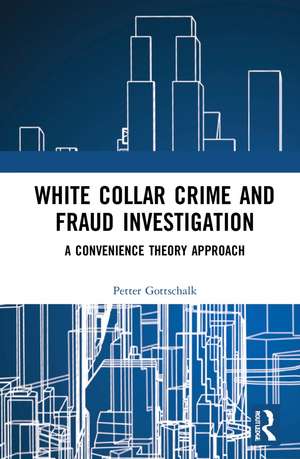White-Collar Crime and Fraud Investigation: A Convenience Theory Approach
Autor Petter Gottschalken Limba Engleză Hardback – 19 noi 2021
The study of white-collar offenders has received increased attention in recent years. This book contributes to our understanding of financial crime by privileged individuals in professional settings by identifying convenience themes for offenders. Based on the theory of convenience, the work presents a number of case studies to identify convenience in financial motive, organizational opportunity, and willingness for deviant behavior. Case studies presented are from Austria, Asia, Congo, Denmark, Germany, Norway, Sweden, and the United States.
The book will be of interest to researchers and academics in Law, Criminology, Business, and Sociology. It will also provide a valuable resource for fraud examiners, defense attorneys, police investigators, and prosecutors.
| Toate formatele și edițiile | Preț | Express |
|---|---|---|
| Paperback (1) | 384.48 lei 6-8 săpt. | |
| Taylor & Francis – 31 mai 2023 | 384.48 lei 6-8 săpt. | |
| Hardback (1) | 1001.55 lei 6-8 săpt. | |
| Taylor & Francis – 19 noi 2021 | 1001.55 lei 6-8 săpt. |
Preț: 1001.55 lei
Preț vechi: 1221.40 lei
-18% Nou
Puncte Express: 1502
Preț estimativ în valută:
191.64€ • 200.09$ • 158.61£
191.64€ • 200.09$ • 158.61£
Carte tipărită la comandă
Livrare economică 04-18 aprilie
Preluare comenzi: 021 569.72.76
Specificații
ISBN-13: 9781032126616
ISBN-10: 1032126612
Pagini: 222
Ilustrații: 34 Line drawings, black and white; 1 Tables, black and white; 34 Illustrations, black and white
Dimensiuni: 156 x 234 x 14 mm
Greutate: 0.49 kg
Ediția:1
Editura: Taylor & Francis
Colecția Routledge
Locul publicării:Oxford, United Kingdom
ISBN-10: 1032126612
Pagini: 222
Ilustrații: 34 Line drawings, black and white; 1 Tables, black and white; 34 Illustrations, black and white
Dimensiuni: 156 x 234 x 14 mm
Greutate: 0.49 kg
Ediția:1
Editura: Taylor & Francis
Colecția Routledge
Locul publicării:Oxford, United Kingdom
Public țintă
PostgraduateCuprins
PART I THEORETICAL PERSPECTIVES
1 Characteristics of White-Collar Offenders
2 Theory of Offending Convenience
3 Internal Fraud Investigation Reports
PART II EMPIRICAL CASE STUDIES
4 Austria: Biathlon Union by IBU Commission
5 Congo: Mercy Corps Aid by Smith
6 Denmark: Danske Bank by Plesner
7 Denmark: Banedanmark by Kammeradvokaten
8 Denmark: Ejendomsstyrelse by Kammeradvokaten
9 Germany: Wirecard Banking by KPMG
10 Japan: Olympus by Kainaka
11 New Zealand: Fuji Xerox by Ito
12 Norway: Stamina Health Care by Salten
13 Norway: Equinor Energy by Bellona
14 Norway: Nittedal Mayor by Grimstad
15 Norway: Rogaland Roads by PwC
16 Sweden: Nasdaq Clearing by Finansinspektionen
17 USA: Apollo Global Management by Dechert
18 USA: University Berkeley by State Auditor
1 Characteristics of White-Collar Offenders
2 Theory of Offending Convenience
3 Internal Fraud Investigation Reports
PART II EMPIRICAL CASE STUDIES
4 Austria: Biathlon Union by IBU Commission
5 Congo: Mercy Corps Aid by Smith
6 Denmark: Danske Bank by Plesner
7 Denmark: Banedanmark by Kammeradvokaten
8 Denmark: Ejendomsstyrelse by Kammeradvokaten
9 Germany: Wirecard Banking by KPMG
10 Japan: Olympus by Kainaka
11 New Zealand: Fuji Xerox by Ito
12 Norway: Stamina Health Care by Salten
13 Norway: Equinor Energy by Bellona
14 Norway: Nittedal Mayor by Grimstad
15 Norway: Rogaland Roads by PwC
16 Sweden: Nasdaq Clearing by Finansinspektionen
17 USA: Apollo Global Management by Dechert
18 USA: University Berkeley by State Auditor
Notă biografică
Petter Gottschalk is Professor in the Department of Leadership and Organizational Behavior at BI Norwegian Business School in Oslo, Norway. Dr. Gottschalk has published extensively on knowledge management, intelligence strategy, police investigations, white-collar crime, and fraud examinations.
Descriere
This book applies a structural model of convenience theory to suspected crime and a maturity model to investigation reports. Evidence of white-collar convenience themes in each case study is derived from internal investigation reports by fraud examiners.
